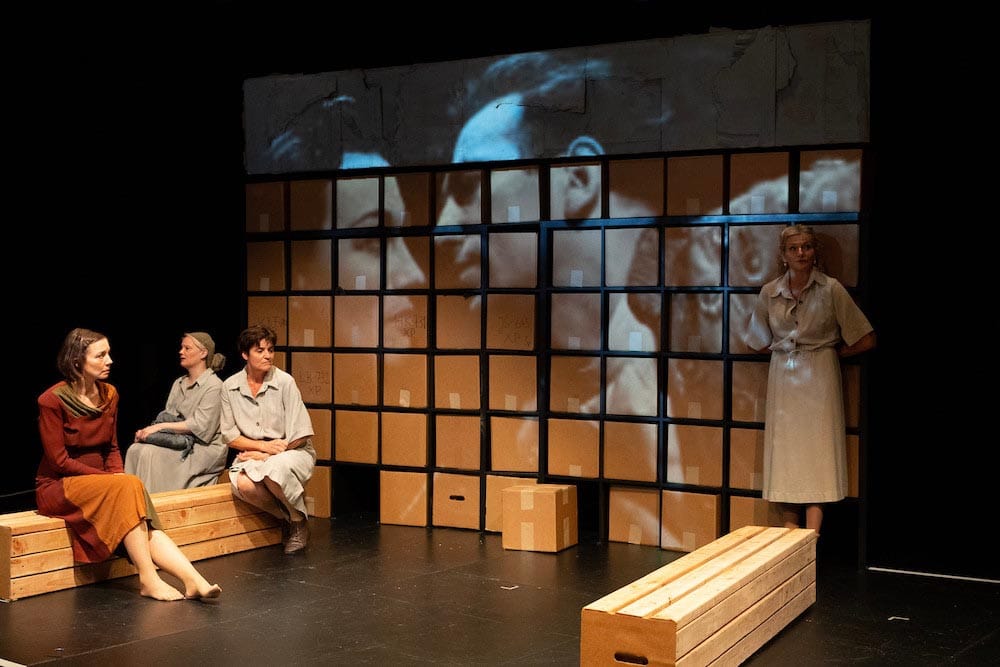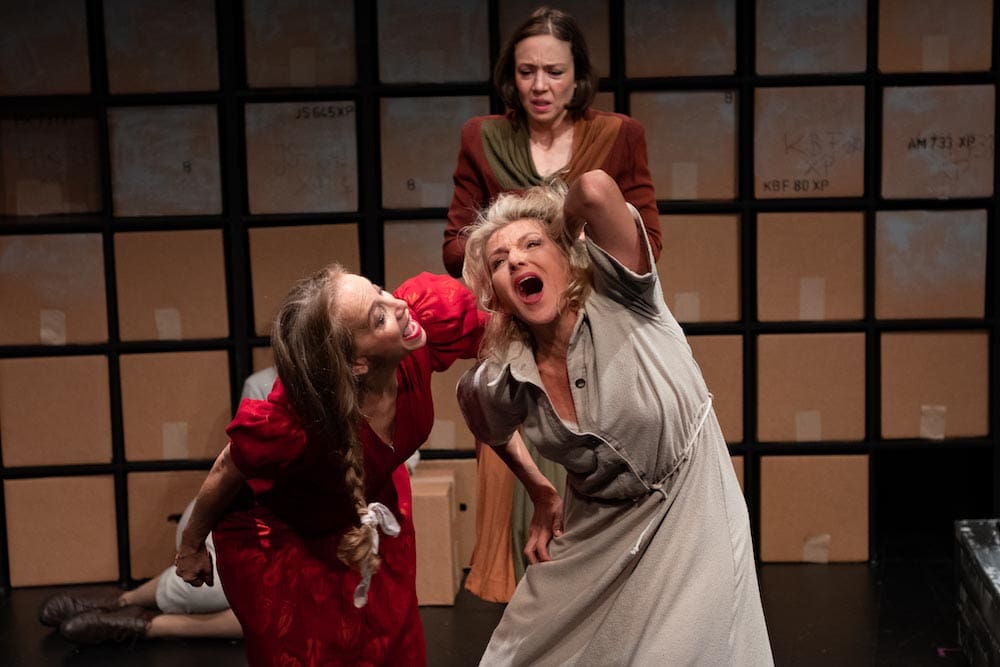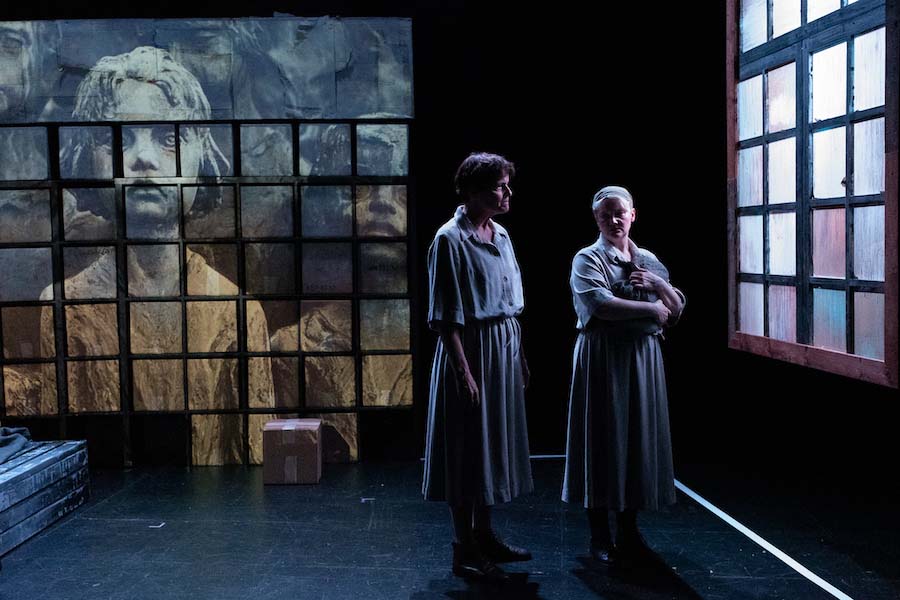“Keep the company of those who seek the truth—run from those who have found it.”
—Václav Havel
The judgment of history is something some people don’t tend to think about. Either they don’t care, they are sure it will be favorable for them, or they don’t think about history at all. At this time in our history, we face numerous crises. It is helpful to look at how others were judged, and how they judged themselves. This is the journey we as an audience take as we watch Pankrác ’45 at ExPats Theatre. It is moving and essential theater.

The Nazis have been defeated; it is the summer of 1945. The Prague People’s Court is sending traitors to public execution or prison. Death sentences are meant to be carried out within two hours, which can be postponed by one hour at the request of the accused. Artists, being in the public eye, are a particular target.
We are in the presence of five women who share the same cell in the famous Pankrác Prison. The meeting of these women is fictional, but the events they describe are true. One, Lída Baarová (Stacy Whittle), is a successful film actress known for a lengthy affair with Joseph Goebbels (1897–1945), the Nazi propaganda minister. Another notable actress, Adina Mandlová (Karin Rosnizeck), is accused of a relationship with Karl Hermann Frank (1898–1946), a Sudeten German who worked closely with Hitler. The two women taunt each other:
Lída to Adina: I don’t understand how someone so insensitive can be an actress.
Adina to Lída: I don’t understand how someone so oversensitive can be an actress.
Adina denies what the French call “collaboration horizontale.” “Someone was f**king the top Nazis but it sure wasn’t me,” she proclaims. Lída states that she knows nothing about politics and had no idea there were concentration camps. One wonders what she, an actress, thought of her lover Goebbels’s book-burning ceremony in Berlin, or his many other crimes against the arts.

Julie (Lisa Hodsoll) is quiet and stoic. She is Jewish, and she grimly recites the places she was, step by step, not permitted to go: the cinema, public parks and gardens, woods or forests. She was also forbidden to have a telephone, drive a car, or buy legumes, cheese, sweets, fish, poultry, or game. We gradually learn that she is a survivor of Auschwitz. Why is she here?
Nová (Aniko Olah), the new inmate, is a mystery. No one knows who she is. She is beautiful and silent. Hana Krupková (Sara Barker) says she was part of the resistance and is the victim of a misunderstanding. She “didn’t inform on anyone!” she claims, but she has been told her husband, who was also arrested, is testifying against her. She doesn’t believe it.
The women talk of love, loss, and the lives they once lived with wit and bitterness. There are no simple answers, and many of their stories seem forced or even untrue. Each of them had to use a strategy to survive; some seem to feel guilty, and some don’t.
Stacy Whittle’s Lída appears to be the most naïve if she is telling the truth. She is vain, pettish, and utterly self-absorbed. If Goebbels treated her impeccably, it doesn’t seem to matter to her how he treated anyone else. Whittle’s performance makes Lída a compelling character, even if of necessity an unsympathetic one.
Rosnizeck’s Adina is wonderfully flamboyant, a strong personality with a wicked sense of humor. Like Lída, she uses talent and sexuality to survive. But she has few illusions, about the Germans or anything else. Her gift is self-confidence, and she plans to use it. Julie (Lisa Hodsoll), like all the other women, has a secret. Hodsoll’s performance builds beautifully up to the moment we learn the truth. And then we wonder why we didn’t realize it all along.
Nová has a huge transition to make, and is in some ways treated the worst of all. Aniko Olah presents Nová as not simply a mother, which she is, but as a complex character with her own motivations. Mothers, of course, were prized in the Reich, and women could manipulate this stereotype to their advantage.
Sara Barker as Hana keeps us guessing throughout. Is she really a member of the resistance, or did she inform? She tells a touching story about how she met her husband. Her love for him seems sincere. But, to Barker’s credit, we are never sure who she is or what her convictions are. Resistance, as a strategy, has value. But is that what she is doing?

Crucial events in the history of the Czech occupation are in play: the assassination of high-ranking SS officer and acting governor Reinhard Heydrich (1904–1942). He chaired the Wannsee Conference, which formulated the Final Solution. He was ambushed by a team sent by the Czech government-in-exile; the village of Lidice was razed in consequence, and most of the inhabitants killed. A similar massacre was repeated in the town of Ležáky on July 24, 1942. I highly recommend reading the program if, like me, you are unfamiliar with some of the history.
Martina Kinská’s play, as translated by Barbara Day, is spare but full of colorful language. Directed with intensity and flair by Melissa B. Robinson and Karin Rosnizeck, it is somewhat reminiscent of Jean-Paul Sartre’s No Exit.
Designer Brandee Mathies’s costumes evoke the period and enhance our sense of character. Lighting by Marianne Meadows, scenic and projections design by Johnny Dahm Robertson, and sound design by Karin Rosnizeck reflect the excellence of the entire production.
At the end, we learn what happened to each of the women. We remember them as much for their hopes and dreams as their actual lives. And they are all unforgettable.
Running Time: Approximately 90 minutes, with no intermission.
Pankrác ’45 runs through November 21, 2021, presented by ExPats Theatre performing at Atlas Performing Arts Center, Lab II, 1333 H Street NE, Washington, DC. Performances are Thursday, Friday, and Saturday at 7:30 pm; Sunday matinee at 2:30 pm. Tickets ($35 adult, $30 senior, $20 students) are available online.
For COVID safety, vaccination proof or negative test result and mask-wearing are required.
Content warnings: This production uses intermittent light and projection patterns such as flickering lights, adult language, and sounds of the gallows that may be disturbing to some audience members. Patrons that may suffer from epilepsy & other visual light stimulation are advised to contact the front-of-house staff prior to entering the auditorium.
Pankrác ’45 by Martina Kinská at ExPats Theatre
in partnership with the Embassy of the Czech Republic
CAST
Julie: Lisa Hodsoll
Adina: Karin Rosnizeck
Hana: Sara Barker
Lída: Stacy Whittle
Nová: Aniko Olah
CREATIVE TEAM
Playwright: Martina Kinská
Translator: Barbara Day
Directors: Melissa B. Robinson and Karin Rosnizeck
Assistant Director: Kate Foster
Stage Manager: Valarie McFatter
Costume Designer: Brandee Mathies
Lighting Designer: Marianne Meadows
Scenic & Projections Designer: Johnny Dahm Robertson
Sound Designer: Karin Rosnizeck
Fight Choreographer: Bette Cassatt
Accent Coach: Mary Mayo
SEE ALSO:
ExPats Theatre to stage gut-wrenching war drama Pankrác ’45




